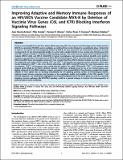Por favor, use este identificador para citar o enlazar a este item:
http://hdl.handle.net/10261/345633COMPARTIR / EXPORTAR:
 SHARE SHARE
 CORE
BASE CORE
BASE
|
|
| Visualizar otros formatos: MARC | Dublin Core | RDF | ORE | MODS | METS | DIDL | DATACITE | |

| Título: | Improving Adaptive and Memory Immune Responses of an HIV/AIDS Vaccine Candidate MVA-B by Deletion of Vaccinia Virus Genes (C6L and K7R) Blocking Interferon Signaling Pathways |
Autor: | García-Arriaza, Juan CSIC ORCID ; Arnáez, Pilar; Gómez, Carmen E. CSIC ORCID; Sorzano, Carlos Óscar S.; Esteban, Mariano CSIC ORCID | Fecha de publicación: | 2013 | Resumen: | Poxvirus vector Modified Vaccinia Virus Ankara (MVA) expressing HIV-1 Env, Gag, Pol and Nef antigens from clade B (termed MVA-B) is a promising HIV/AIDS vaccine candidate, as confirmed from results obtained in a prophylactic phase I clinical trial in humans. To improve the immunogenicity elicited by MVA-B, we have generated and characterized the innate immune sensing and the in vivo immunogenicity profile of a vector with a double deletion in two vaccinia virus (VACV) genes (C6L and K7R) coding for inhibitors of interferon (IFN) signaling pathways. The innate immune signals elicited by MVA-B deletion mutants (MVA-B ΔC6L and MVA-B ΔC6L/K7R) in human macrophages and monocyte-derived dendritic cells (moDCs) showed an up-regulation of the expression of IFN-β, IFN-α/β-inducible genes, TNF-α, and other cytokines and chemokines. A DNA prime/MVA boost immunization protocol in mice revealed that these MVA-B deletion mutants were able to improve the magnitude and quality of HIV-1-specific CD4(+) and CD8(+) T cell adaptive and memory immune responses, which were mostly mediated by CD8(+) T cells of an effector phenotype, with MVA-B ΔC6L/K7R being the most immunogenic virus recombinant. CD4(+) T cell responses were mainly directed against Env, while GPN-specific CD8(+) T cell responses were induced preferentially by the MVA-B deletion mutants. Furthermore, antibody levels to Env in the memory phase were slightly enhanced by the MVA-B deletion mutants compared to the parental MVA-B. These findings revealed that double deletion of VACV genes that act blocking intracellularly the IFN signaling pathway confers an immunological benefit, inducing innate immune responses and increases in the magnitude, quality and durability of the HIV-1-specific T cell immune responses. Our observations highlighted the immunomodulatory role of the VACV genes C6L and K7R, and that targeting common pathways, like IRF3/IFN-β signaling, could be a general strategy to improve the immunogenicity of poxvirus-based vaccine candidates. | URI: | http://hdl.handle.net/10261/345633 | DOI: | 10.1371/journal.pone.0066894 |
| Aparece en las colecciones: | (CNB) Artículos |
Ficheros en este ítem:
| Fichero | Descripción | Tamaño | Formato | |
|---|---|---|---|---|
| García-Arriaza et al., 2013. Plos One.pdf | Articulo principal | 2,44 MB | Adobe PDF |  Visualizar/Abrir |
CORE Recommender
PubMed Central
Citations
43
checked on 28-may-2024
SCOPUSTM
Citations
55
checked on 23-may-2024
WEB OF SCIENCETM
Citations
55
checked on 23-feb-2024
Page view(s)
16
checked on 28-may-2024
Download(s)
13
checked on 28-may-2024
Google ScholarTM
Check
Altmetric
Altmetric
Artículos relacionados:
NOTA: Los ítems de Digital.CSIC están protegidos por copyright, con todos los derechos reservados, a menos que se indique lo contrario.


